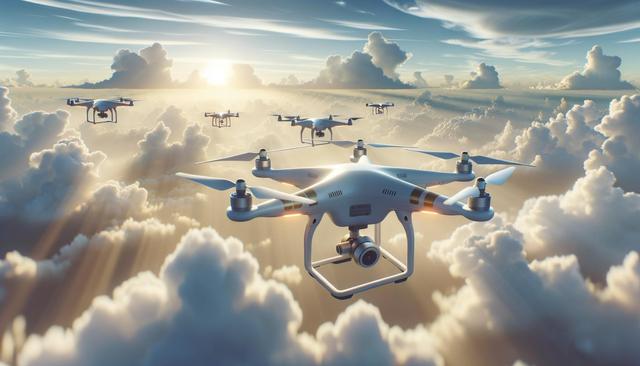What is a Drone?
A drone, formally known as an unmanned aerial vehicle (UAV), is a type of aircraft that operates without a human pilot on board. Controlled either remotely by a pilot or autonomously through pre-programmed flight paths, drones have become increasingly popular across various industries as well as for recreational use. Originally developed for military purposes, they now serve a wide range of civilian applications such as aerial photography, real estate marketing, environmental monitoring, and search and rescue operations. Most consumer drones are equipped with GPS, cameras, and stabilization systems, making them accessible and relatively easy to fly for beginners and professionals alike.
As technology has advanced, drones have become smaller, more affordable, and more capable. They range from compact models that fit in the palm of your hand to larger, more robust versions used in agriculture and industrial inspections. The inclusion of features like obstacle avoidance, return-to-home functionality, and real-time video transmission has expanded their appeal to hobbyists and professionals alike. Whether you’re looking to capture stunning aerial views or automate certain tasks, drones offer a practical and engaging solution.
Who Should Consider Getting a Drone?
Drones are suitable for a wide variety of individuals and purposes. Whether you’re an enthusiast looking for a new hobby or a professional seeking to enhance your workflow, there’s likely a drone that fits your needs. Here are some groups who may benefit from owning or using a drone:
- Photography and Videography Enthusiasts: Drones offer new creative angles and perspectives that traditional cameras can’t provide.
- Real Estate Agents: Aerial footage can make listings more appealing and informative.
- Farmers and Agronomists: Agricultural drones help monitor crop health and plan irrigation efficiently.
- Surveyors and Engineers: Drones can collect data from hard-to-reach places safely and quickly.
- Recreational Flyers: For those who enjoy flying as a hobby, drones offer an exciting and educational pastime.
Even educators and students are integrating drones into STEM learning environments, using them to teach principles of physics, programming, and robotics. Before purchasing, it’s important to consider your intended use, as different models cater to different needs.
Key Features to Look for in a Drone
With countless models available, selecting the right drone can be overwhelming. Understanding the key features can help you make an informed decision. Here are some important aspects to evaluate:
- Camera Quality: Look for drones with high-resolution cameras if photography or videography is your goal.
- Flight Time: Drones typically have a battery life ranging from 10 to 30 minutes per flight. Longer flight times are preferable for extended tasks.
- Range: Depending on your needs, consider how far your drone can travel from the controller.
- Stabilization: Gimbals and electronic stabilization systems help produce smooth footage.
- Ease of Use: Beginner-friendly features like auto takeoff, landing, and GPS assistance can make flying safer and more enjoyable.
Also, check for safety features such as collision sensors and emergency landing protocols. For professionals, additional functionality like waypoint navigation and payload options may be essential. Matching features to your goals ensures you get the most value from your purchase.
Tips for Buying a Drone Affordably
While some drones come with a high price tag, there are several ways to find a model that suits your budget without sacrificing too much functionality. Here are a few tips to help you buy a drone affordably:
- Start Small: Beginners can opt for entry-level drones that still offer good performance and essential features.
- Look for Bundles: Some retailers offer packages that include extra batteries, propellers, and carrying cases, providing better value overall.
- Buy Refurbished: Certified refurbished drones can be significantly cheaper than new ones and are often tested for quality.
- Wait for Sales: Annual sales events and holidays often bring substantial discounts on electronics, including drones.
- Compare Brands and Models: Research and compare specifications to ensure you’re not overpaying for features you don’t need.
It’s also helpful to read user reviews and watch video demonstrations to understand performance in real-world conditions. By taking the time to explore your options, you can find a quality drone that meets your needs and budget.
Staying Safe and Legal While Flying
Flying a drone comes with responsibilities, especially when it comes to safety and legal compliance. Before taking to the skies, it’s essential to familiarize yourself with the rules and guidelines that apply in your area. Here are some general best practices:
- Register Your Drone: Depending on your country, drones over a certain weight may need to be registered with aviation authorities.
- Respect No-Fly Zones: Stay away from airports, military bases, and other restricted areas.
- Keep Line of Sight: Always maintain visual contact with your drone while flying.
- Fly Below Legal Altitudes: Most regions have limits, typically around 400 feet or 120 meters.
- Be Mindful of Privacy: Avoid flying over private property without permission.
Many countries also require drone pilots to complete basic training or certification for commercial use. Adhering to these rules not only ensures your safety but also helps maintain a positive reputation for drone enthusiasts. Being a responsible pilot contributes to the broader acceptance and integration of drones in various sectors.
Conclusion: Choosing the Right Drone for Your Needs
Drones offer an exciting blend of technology and creativity, making them accessible tools for enthusiasts, professionals, and learners alike. Whether you’re interested in aerial photography, mapping, agriculture, or simply enjoying a new hobby, there’s likely a drone that fits your requirements and budget. By understanding the different types, features, and buying strategies, you can make a well-informed decision that aligns with your goals. As long as you follow safety guidelines and local regulations, your drone experience can be both enjoyable and rewarding. With thoughtful planning and research, stepping into the world of drones can be a smooth and worthwhile journey.






